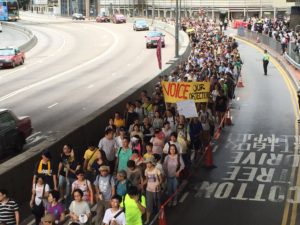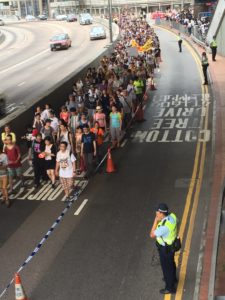Democracy in Asia: July 1 in Hong Kong
 Hong Kongers gather to protest every year on July 1, the HKSAR (Hong Kong Special Administrative Region) Establishment Day. The protest usually gathers up to 500,000 citizens, all demanding democracy and free elections.
Hong Kongers gather to protest every year on July 1, the HKSAR (Hong Kong Special Administrative Region) Establishment Day. The protest usually gathers up to 500,000 citizens, all demanding democracy and free elections.
This year Hong Kongers took to the street to voice their demands to their Chief Executive and to raise international concern. The air was thick as people gathered along the blockaded pathways in the streets of the busy Central district. Some protesters carried yellow umbrellas with them, decorated with political slogans, a symbol commemorative of the 2014 Umbrella Revolution. Others carried banners and posters with Chinese characters. Still others carried fans for relief from the oppressive heat. Two marchers carried megaphones, leading chants in Cantonese that were echoed by the throngs of people behind them.
The July 1 protests are a yearly occurrence in Hong Kong. When the Chinese lost the Opium War to the British Empire in 1860, Hong Kong was ceded to the British. The land was leased to Britain up to 1997, when the Chinese government assumed control over the region. Hong Kongers were promised 50 years of minimal interference from the Chinese government, and this policy of retaining capitalism in Hong Kong, while communist China maintains control over HKSAR, was called “one country, two systems”.
Many Hong Kongers believe that Deng Xiao Ping’s “one country, two systems” policy has remained a promise unfulfilled. As Beijing politicians increasingly exercise control over Hong Kong elections, locals worry for their future. The protesters demand greater freedoms, ranging from greater choice in selecting their leader (the Chief Executive), to complete independence. Dependent on China for trade and defense, but intent on retaining their capitalist identity, Hong Kongers face a unique dilemma. So they protest every year, and Beijing does not interfere so long as the demonstrations are short-lived and peaceful.
Hong Kongers value democracy, freedom of speech, and rule of law. The protesters embodied all these values on their July 1 yearly march. They organized in public, asking for free, democratic governance. Yet they marched through blockaded pathways without obstructing traffic flow, remaining peaceful and nonviolent. And when the march concluded at the Admiralty train station, the protesters filed into an orderly queue into the mouth of the metro stop. Hong Kongers stage protests in true Western democratic style. Yet their practice conforms to Eastern values of harmony and rule of law.
As an American, it was fascinating to witness these political demands. Hong Kongers are accustomed to minimal governmental interference, thanks to laissez-faire colonialism under British rule. However in some ways, the Hong Kong protests voice the demands for liberal reforms echoed all over China. Over the past two years, the protests in Hong Kong have had a low rate of participation. Only time will tell if these pleas for reform will spark change, or end in a stalemate and maintain the current status quo.

